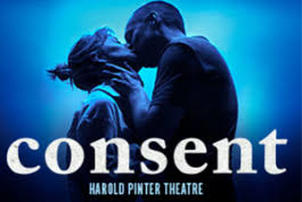 How is London’s “School of Rock” Holding Up Two Years Later?by Randi / July 26, 2018
How is London’s “School of Rock” Holding Up Two Years Later?by Randi / July 26, 2018The last time I was in London’s Harold Pinter Theatre was for the sublimely disappointing ‘Oslo’, which featured just as much screaming as ‘Consent’. However, the key difference is that the screaming in ‘Consent’ feels earned, and completely necessary. (Hey while you’re here open that ‘Oslo’ review in a new tab because it’s remarkable.) Also making this an entirely different experience? ‘Consent’ was riveting. This well written, incisive new play by Nina Raine made me feel miserable the entire time, but in a great way that good plays are supposed to. It’s timely (I don’t want to be the 1000th reviewer to mention the #MeToo movement in a review for this play but look I just did), it’s well acted, and it will make you feel like everything is hopeless and everyone is a monster and it’s best to just sit in the dark alone quietly for most of your life. Like a good play should!
Now, it goes without saying that the accused need to have representation, and fair representation at that, to promote their best interests in court and to serve justice overall. Defense attorneys are important and necessary to our criminal justice system. (I’m conflating US and UK law in this area because it’s similar enough.) But defense attorneys for accused rapists are a special breed. I have witnessed a lot of rape trials, a lot a lot, and during an internship for a public prosecutor I was involved in a lot of those trials. So I think it’s fair to say I’m more of an expert than the average person on the legal aspects of this play. And Nina Raine has nailed the coldness, the sickening twisting of words, the unfair focus on negligible details that every defense attorney I’ve seen in a rape case will employ. It’s hard to think about, but most of them were pure evil. And I really mean those words. The worst of humanity I could ever imagine have been in those court rooms with me. I remember a case that was lost because the defense attorney got the jury to laugh at a gay witness, the roommate of the rape victim. He kept making gay jokes and ‘prancing’ about when he repeated parts of the witness’s testimony, and since the judge and jury were some of the many, many shitty people on this planet, they thought it was hilarious and ‘voted’ for the funny lawyer. It’s not an issue of putting up the best case for their client, which is their job. It’s that they seem to revel in the unnecessary, unsettling glee they find in demolishing already fragile witnesses (victims), in using their words and their trauma against them to prove a point – that it doesn’t matter if you were raped; all that matters is whether you are presentable, well spoken, and completely faultless in every aspect of your life. And it’s definitely not about getting at the truth, which is rarely the point of any trial.
And ‘Consent’ captured this ease of evil more than any other work I’ve seen try to. Quickly, the marriages are revealed to be on shaky ground, which is not surprising when dealing with people without the ability to empathize. Ed, our main man (Stephen Campbell Moore, terrific and terrifying), is alarming in his calculated, supremely logical look at the world, which works to win him cases but unsettles his wife Kitty (the excellent Claudie Blakley (and yes that’s spelled right I know the e and the l look like they should be swapped but alas I cannot change her name)). He’s the guy who uses logic to kill empathy and truth when it doesn’t make enough logical sense for him, and he values dispassionate logic over the truth when said truth is the kind that demands an emotional response. His absolute lack of empathy struck me right to my core, and watching him both at work and at home made me feel the same powerless yet overwhelming rage I would feel in court. I was glad when Kitty would yell at him the things I wanted to yell out (and from a front row seat, I really almost did), and I was glad that she seemed to have the right footing in such a difficult relationship. But the second act proves that she’s not the moral savior I wanted her to be, which is both disappointing and more realistic. No one is perfect, although it in this play it’s more like everyone is actually a shithead.
The other married barrister couple is Rachel (Sian Clifford) and Jake (Adam James, who my brain kept trying to make into Michael C. Hall). Jake is revealed early on to be cheating on his wife, but he’s not sorry for his actions, only sorry he got caught. He’s very clear on that and doesn’t understand why anyone would fault him for his stance. And he’s the kind of guy that would frame his argument in such a way that it would leave you without a response, almost thinking that maybe he was right – the kind of guy that’s a good barrister, and an asshole. Rachel is the one on the other side, a prosecutor, so I also put the unfair burden on her that I initially put on Kitty – that they’d be my female voices of reason against the men. Of course, people are more complicated than that, and she also let me down, with her second act opinions when it comes to the title of the play. White women, am I right!
The other friends are Zara (Clare Foster), the goofy (pitch perfect) actress friend, and Tim (Lee Ingleby), the awkward barrister who seems hapless but ‘nice’, but shows he sucks just as much. That everyone kind of sucks at times and you want to punch them all at times and you also just see them as normal sometimes all makes ‘Consent’ so convincing, and everyone so real. They’re all people you probably know in real life.
But the best part of the play is when it actually shows the rape trial, where Ed is defending and Tim is prosecuting. Heather Craney plays the victim, Gayle, and she is everything. I was crying through most of the exquisite first act because of how accurate it all was. Gayle meets Tim literally two minutes before the trial starts. She knows nothing about what’s going to happen or what she’s supposed to do because no one ever cared to inform her. It is the prosecution’s job to make sure the victim knows what to do and does it well, since she is the main part of the state’s case. But just because they should ensure that she is fully informed and ready to testify doesn’t mean it always happens. And Tim’s failure here is an example of that. Busy lawyers who think they have a handle on the facts, and who don’t see any value in devoting time and effort to such a case, might only meet the confused victim out in the hallway before the trial starts, where she might hear for the very first time that anything not in her initial statement to the police, made in the aftermath of debilitating trauma, is inadmissible. And yes that’s a bad lawyer who would do that, but it doesn’t stop it from happening – or being allowed to happen. Such is the case with Tim and Gayle. The short exchange they have says so much about the system: Gayle asks if Tim’s her lawyer, and he laughs that no silly, he’s the lawyer for the Crown. Gayle asks who her lawyer is, and Tim has to explain that she doesn’t have one, she’s just a witness against the accused. But he has a lawyer, right? Well of course he does. And his lawyer is ready to tear down everything the unprepared Gayle says, the silly woman who thought that the truth would be all that was required of her.
The genius of this play is that the failings of the judicial system reflect the personal failings in the people who work in the law. And this makes sense, after all, since society’s structures and systems will reflect the society that made them. This is the most depressing thought from the play, that the systems that are supposed to serve us really won’t improve if humanity doesn’t improve.
I wish that they kept up this theme in the second act, which is much weaker than the first as it mainly focuses on the relationships of the characters and puts the legal stuff aside. I’m obviously biased in my desire for more of the interplay between the two, but when the interpersonal relationships all blow up and there’s so much screaming and crying and so much emotion (so much), it becomes overwhelming. It would have been better, and easier to take in, if it were tempered with more glimpses into the law to provide small respites from all the heated arguments.
But as it is, ‘Consent’ is a really brilliant play. It’s not the GREATEST THING EVER, as I was left wondering at intermission whether it just might be, but it’s quite well done and so well written. The acting was so effective, I felt like all the trauma was my own. All these people are terrible, yet normal. Which scares me. Is everyone a monster? Does every person cheat? Like every single one? Because that’s what this play is telling me. I mean I know I’m mean on this blog sometimes (because it’s mine and I can do what I want with it) but I’m not a monster, I believe victims, and I don’t think I would find joy in emotionally torturing someone I love. But that’s just me I guess!
INFORMATION
The play is at the Harold Pinter Theatre until August 11. It runs about two and a half hours, with the first act almost 90 minutes and the second much shorter. There was an announcement at the start that one set piece was malfunctioning and so stagehands would be onstage more than usual to move sets, but it was all just loose furniture so I’m not sure how it would have been done without stagehands. Anyway go see it.
AUDIENCE
Typical English play audience, skewing older with lots of chatter among the older ladies. “Oh dear now he’s gone and done that.” “Oh dear he said it he finally said it.” SHUSHHHHHHHHHH. The very old man next to me asked if I was enjoying it at the interval and I said yes it’s quite good and he asked, “are you a lawyer?” and I said “yes?” and he said “I thought you might be!” and now every second of my life will be spent thinking, how…?





